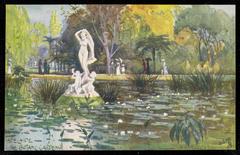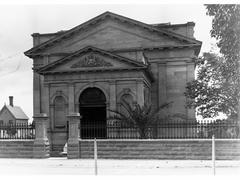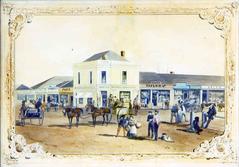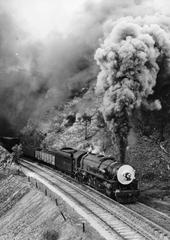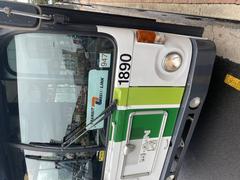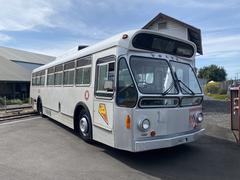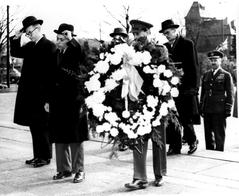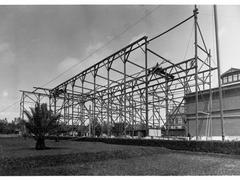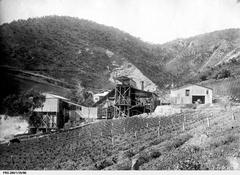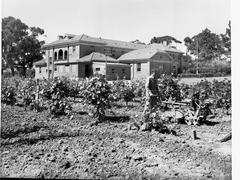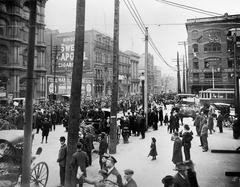Brown Hill Adelaide Visiting Hours, Tickets, and Historical Sites Guide
Date: 03/07/2025
Introduction
Brown Hill, nestled within the scenic Adelaide Hills just southeast of Adelaide’s city center, is a destination that seamlessly blends natural beauty, Indigenous heritage, colonial history, and vibrant recreational opportunities. Known as Wirraparinga to the Kaurna people—the traditional custodians of the land—Brown Hill and the adjoining Brownhill Creek Recreation Park hold deep cultural significance and are a testament to thousands of years of stewardship (City of Mitcham Official Site). Visitors can explore ancient river red gums, rare grey box grassy woodlands, and a diversity of native wildlife, including the endangered southern brown bandicoot, all within a carefully preserved green corridor (Trail Hiking).
Brown Hill also offers a rich historical narrative, from its long-standing use by the Kaurna people to its transformation into a favored spot for early European settlers (World City History). Today, the area is celebrated for its inviting network of walking, hiking, and cycling trails, panoramic views, and community events. With free entry, accessible facilities, and a commitment to conservation, Brown Hill is an essential destination for those seeking to experience Adelaide’s intertwined stories of land, culture, and environment (Experience Adelaide).
Contents Overview
- Introduction
- Indigenous Heritage and Early Significance
- European Exploration and Settlement
- Development of Recreation and Conservation
- Natural Landscape and Biodiversity
- Visiting Brown Hill: Hours, Tickets, and Accessibility
- Key Attractions and Activities
- Facilities and Amenities
- Getting There and Transport Options
- Accommodation
- Safety and Best Times to Visit
- Frequently Asked Questions (FAQs)
- Sources and Further Information
Indigenous Heritage and Early Significance
Brown Hill and Brownhill Creek, or Wirraparinga (“creek and scrub place”), are located on the traditional lands of the Kaurna people. For thousands of years, the Kaurna used this area for sustenance, ceremony, and as a travel route between the plains and hills. The creek, native plants, and wildlife provided essential resources, and the landscape is deeply woven into Kaurna Dreaming stories and ongoing cultural practices (City of Mitcham Official Site).
Today, efforts continue to honor and share Kaurna heritage through interpretive signage, guided walks, and digital resources such as the Kaurna Voices Cultural Mapping Tool (Adelaide Park Lands Association).
European Exploration and Settlement
British settlement began in 1836, with Brown Hill becoming an immediate landmark for early colonists and a vital water source. Early maps from the 1830s and 1840s capture the rapid transformation of the landscape as European settlement expanded (World City History; Experience Adelaide). By the late 19th century, the valley was a popular destination for recreation, and in 1894, a bathing hole was created (later removed for environmental reasons). A stone plaque, declaring the area a “pleasure resort,” still stands at the valley entrance (City of Mitcham Official Site).
Development of Recreation and Conservation
The creation of Brownhill Creek Recreation Park formalized the area’s role as a public reserve, preserving 52 hectares and a 4-kilometre stretch of the creek (Brownhill Creek Recreation Park). The park has evolved into a green corridor through Adelaide’s suburbs, balancing conservation with public access, and reflecting South Australia’s commitment to environmental stewardship (SA History Hub).
Natural Landscape and Biodiversity
Geological and Ecological Features
Brown Hill is part of the Mount Lofty Ranges foothills, featuring steep valleys, rolling hills, and the meandering Brownhill Creek. The park is dominated by ancient river red gums (some over 300 years old), blue gum woodlands, and a rare grey box grassy ecosystem (Trail Hiking). This rich tapestry of flora provides habitat for diverse native plant and animal species.
Wildlife and Conservation
The park supports over 40 species of birds and mammals, including kookaburras, possums, bats, water rats, frogs, and the endangered southern brown bandicoot. Occasional koala sightings add to its appeal. Conservation efforts focus on habitat restoration, invasive species management, and community engagement (Trail Hiking).
Visiting Brown Hill: Hours, Tickets, and Accessibility
- Visiting Hours: Open daily from dawn to dusk.
- Entry Fees: Free entry; no tickets required (South Australia Parks).
- Accessibility: Several well-maintained walking and cycling trails are suitable for various fitness levels; some are wheelchair accessible. Picnic areas and restrooms are available near main entrances.
- Pets: Dogs are welcome on leash in most areas; always check signage for restrictions.
- Guided Tours: Occasional guided walks are available—check the Brownhill Creek Recreation Park website or South Australia Parks for details.
Key Attractions and Activities
Walking and Hiking Trails
- Brown Hill Summit Trail: 2.5 km return, moderately challenging, offering panoramic views of Adelaide and the Mount Lofty Ranges.
- Yurrebilla Trail Connection: Links Brown Hill to Mount Lofty and Cleland Conservation Park with longer hikes.
- Creek-side Paths: Gentle, shaded walks suitable for families and casual visitors.
- Brown Hill and Brown Hill Creek Loop: 6.1 km circuit combining gentle and steep sections (About Adelaide).
Nature and Wildlife Observation
Spot Adelaide Rosellas, Superb Fairy-wrens, kookaburras, kangaroos, echidnas, and occasionally koalas. The creek supports aquatic life, including native fish and frogs.
Picnicking and Relaxation
Shaded picnic areas feature tables, BBQs, and toilets, ideal for family outings.
Cultural and Historical Significance
Interpretive signage shares Kaurna heritage and early European history. Stonework and historic bridges remain as evidence of early settlement (Brownhill Creek Recreation Park).
Photography and Scenic Views
The 312-meter summit is a popular vantage point at sunrise and sunset, with wildflower displays in spring.
Trail Running and Fitness
Brown Hill’s varied terrain attracts runners and mountain bikers (on designated trails).
Educational Experiences
The park is an outdoor classroom for schools and community groups, with interpretive panels on ecology, geology, and Indigenous heritage.
Facilities and Amenities
- Toilets and Showers: Available at key points and the caravan park (Brownhill Creek Caravan Park).
- Picnic Shelters and BBQs: Scattered throughout the park.
- Café: New café on-site for coffee and light meals.
- Playgrounds: Available for children within the caravan park.
- Swimming Pool: Seasonal pool for caravan park guests.
- Public Telephones and Wi-Fi: Provided at the caravan park.
Getting There and Transport Options
By Car
Located 7–8 km southeast of the CBD, Brown Hill is easily reached via South Eastern Freeway or Unley Road. Free parking is available along Brownhill Creek Road and Waite Road (Parks SA).
By Public Transport
Adelaide Metro buses (e.g., Bus 170) operate between the city and the Waite Campus; other nearby stops include Albert Street, Mitcham (Walking SA). Check Adelaide Metro timetables for details.
Cycling and Walking
Bike lanes and dedicated trails connect the CBD to Brown Hill. Cycling is a scenic and sustainable option, and there are bike racks at park entrances (Experience Adelaide). Walking from nearby suburbs is also feasible.
Accommodation
- Brownhill Creek Caravan and Holiday Park: Offers studios, cabins, villas, powered and ensuite caravan sites, and campsites. Facilities include a café, BBQs, swimming pool, play areas, and pet-friendly options (Brownhill Creek Caravan Park).
- Nearby Suburbs: Mitcham, Unley, and Hyde Park offer boutique hotels, B&Bs, and serviced apartments.
Safety and Best Times to Visit
Safety
Adelaide is considered very safe, with a low crime index (WayToStay). Standard precautions apply: avoid isolated areas after dark, secure valuables, and dial 000 for emergencies. In the park, stay on marked trails, carry water, and check weather/bushfire warnings (Parks SA; Travel Safe Abroad).
Best Times to Visit
- Spring: Wildflowers and active wildlife.
- Summer: Ideal for outdoor activities, but monitor bushfire risk (WayToStay).
- Autumn: Pleasant weather for hiking.
- Winter: Lush scenery after rain; fewer crowds.
Frequently Asked Questions (FAQs)
Q: What are the opening hours?
A: Daily from dawn to dusk.
Q: Is entry free?
A: Yes, no tickets required.
Q: Are dogs allowed?
A: Yes, on leash in most areas.
Q: Is the park wheelchair accessible?
A: Many trails and picnic areas are accessible; some paths may be steep or uneven.
Q: Are guided tours available?
A: Yes, check the official park website for schedules.
Q: Where can I park?
A: Free parking is available at main entrances.
Q: How do I get there by public transport?
A: Use Adelaide Metro buses; see above for details.
Visuals and Media
Interactive maps, photo galleries, and virtual tours are available on the Parks SA website, featuring images with descriptive alt text such as “Brown Hill summit at sunset” and “Ancient river red gums along Brownhill Creek.”
Sources and Further Information
- City of Mitcham Official Site
- World City History
- Experience Adelaide
- Trail Hiking
- Parks SA
- Brownhill Creek Caravan and Holiday Park
- Adelaide Park Lands Association
- South Australia Tourism
- Experience Adelaide Transport and Parking
- Walking SA
- WayToStay
- Travel Safe Abroad
Conclusion
Brown Hill and Brownhill Creek Recreation Park are unique assets to Adelaide’s cultural and natural landscape, offering a harmonious blend of Indigenous heritage, colonial history, and biodiversity. With free access, extensive trails, excellent facilities, and a commitment to conservation and accessibility, Brown Hill is a welcoming destination for families, adventurers, and history enthusiasts alike. Plan your visit today and experience one of Adelaide’s most cherished historical and natural sites.
For the latest updates on visiting hours, events, and guided tours, download the relevant apps, consult official resources, and follow local channels.
